Want to sell digital products but don’t know where to start? Or maybe you’re already selling online and are ready to supercharge your earning potential.
You’ve come to the right place.
At Whop, we want everyone to build a successful online business. That’s why we LOVE digital products.
Why? Not only are they easy to create but digital products are a fantastic way to earn juicy passive income. That means the money keeps rolling in 24/7 without you doing a thing.
The catch? Well, you need to make sure your products get in front of the right customers who will pay for your content.
So, if you have digital products to sell, we’ve listed the 15 best places to list your ebooks, podcasts, courses…and everything in between.
You’ll also find out why we are your number-one destination for making money with digital products.
What are Digital Products?
Digital products are those available in an electronic format (i.e. not physical items that you can touch, such as clothes or food items).
If you're reading this then you likely already know what digital products are, but let's recap them just incase. When selling a digital product, the buyers download the content onto a device, print it out, or stream audiovisuals. They can also interact with online courses or coaching.
Examples of digital products include:
Digital product sales have risen by nearly 70% over the past two years, comprising a not insignificant 3% of US consumer spending in 2023. Of all of these, courses remain the top digital product:
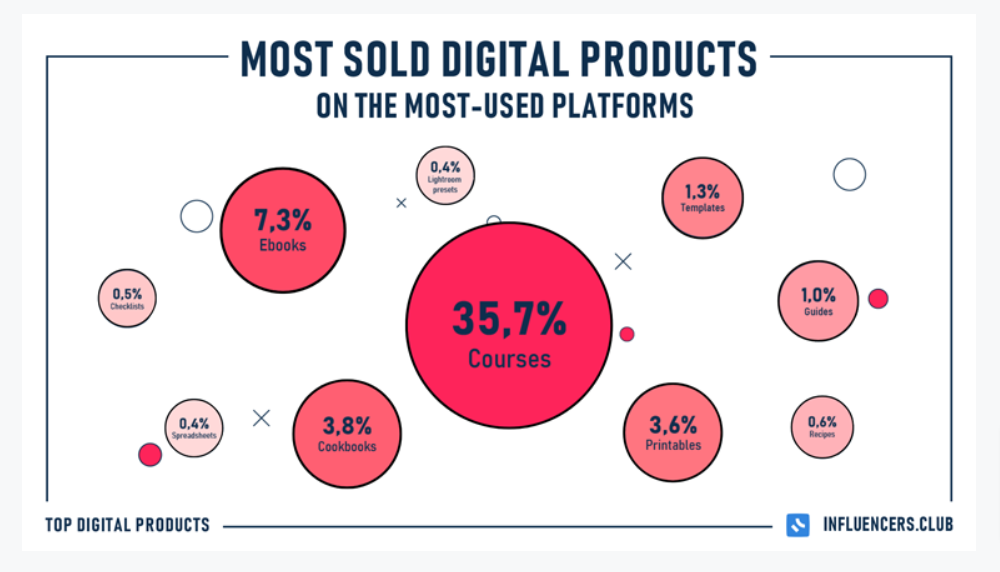
Best Platforms for Selling Digital Products
To help you find the best places to sell digital products, we’ve listed some popular platforms.
As you’ll see, some of these platforms are best for certain types of content, while others are good for everything. Speaking of which…
1.🏆Whop

Whop is the best platform for launching your online business.
Easy to set up and offering unlimited flexibility, Whop is the ultimate place to grow and scale your entrepreneurial ambitions.
You can create your own “whop” internet hub to give your audience the ability to access and buy all kinds of digital content and other products, too.
Sell ebooks, courses, podcasts, webinars, downloadables, access to paid communities and much more on the customizable Whop platform. Plus, you can manage everything through the user-friendly interface.
Cost: No monthly fee with a modest 3% fee on sales (tailored enterprise-level pricing also available).
Best for: Selling anything and everything online.
2. Shopify
One of the most popular ecommerce sites, Shopify has become the go-to for many online sellers.
The platform makes it easy to set up an online storefront from where you can sell digital or physical products.
For example, these guys sell online music samples through their Shopify store:
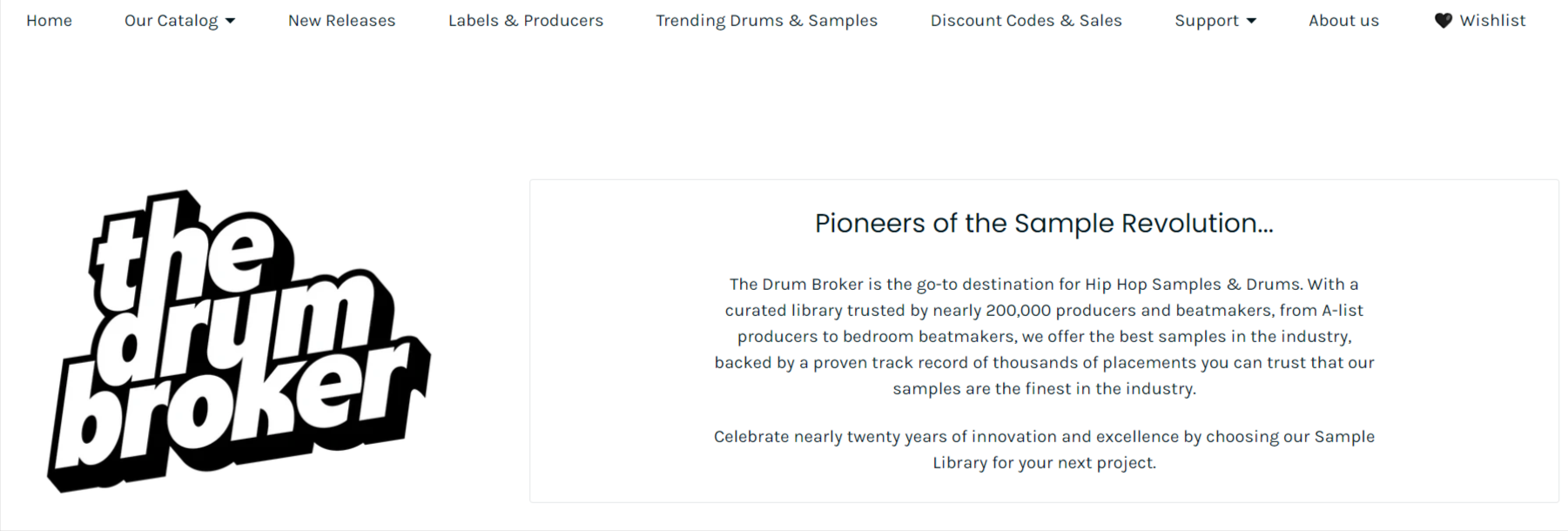
Shopify promises customers a seamless buying experience and a streamlined interface for sellers.
However, the typical complaint against Shopify concerns the steep, tiered pricing.
Cost: Plans start at $29 a month (after the first month at $1), plus transaction processing fees. A three-day free trial is available. Shopify also offers add-ons, which are charged separately.

Best for: Selling multiple types of digital products (but the pricing might be a sticking point for many users).
3. eBay
Many people think of eBay as just a hub for buying and selling physical goods. But you can also sell digital products on eBay. These include ebooks, video tutorials, digital art, and music.
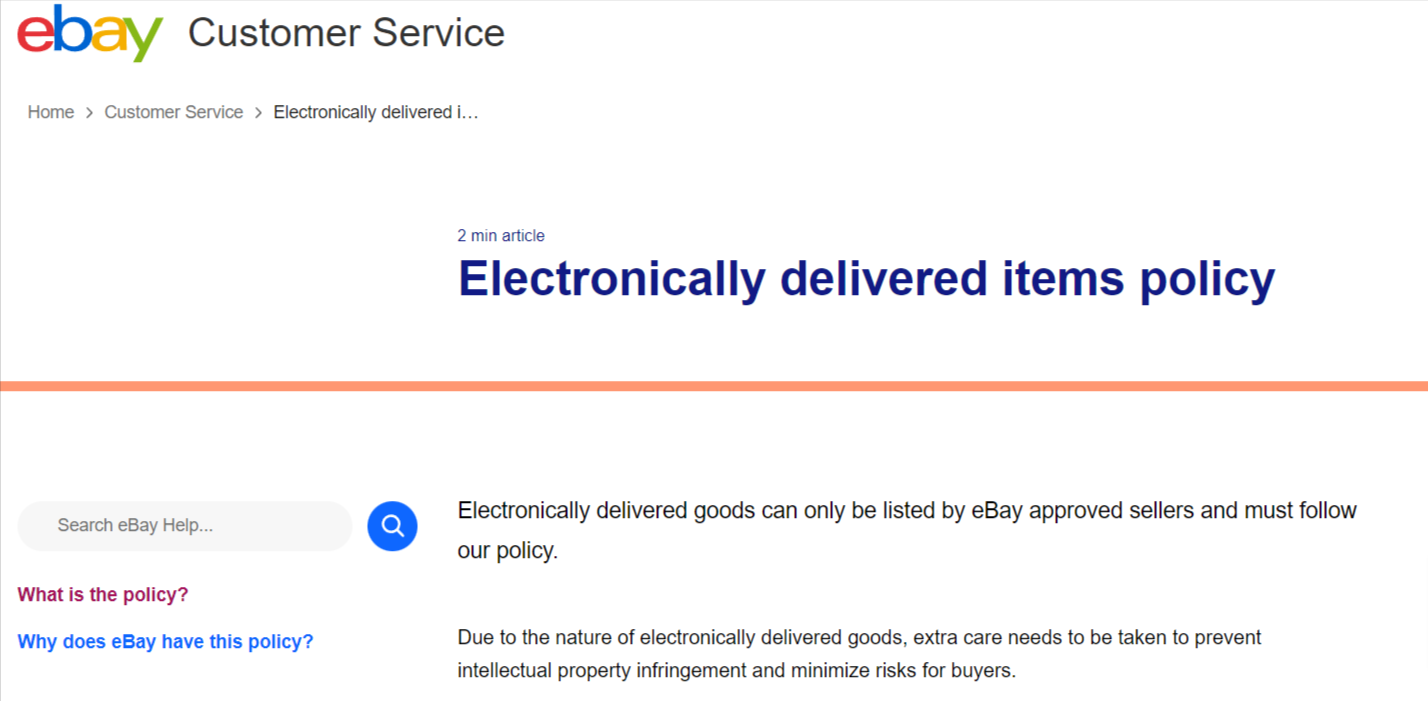
However, there are some restrictions on selling digital products on eBay which make it less attractive than some other platforms. For example, selling digital products is limited to eBay-approved sellers.
The site’s main concerns are delivery tracking and avoiding the sale of copyrighted items – both of which can be a challenge in respect of digital products.
It is important to familiarize yourself with the site’s policies, especially those relating to prohibited items. These include online gaming virtual items and explicit (adult) images.
While getting started can be a challenge, digital content is growing in popularity on eBay, so it’s worth navigating the web of policies and restrictions.
Cost: Varies – eBay typically charges a listing fee and a transaction fee as a percentage of the selling price.
Best for: Established eBay sellers with a positive reputation who want to branch out to digital products.
4. Podia
Podia is an all-in-one platform for selling digital products, including courses and webinars. In fact, it’s largely geared towards teachers and instructors.
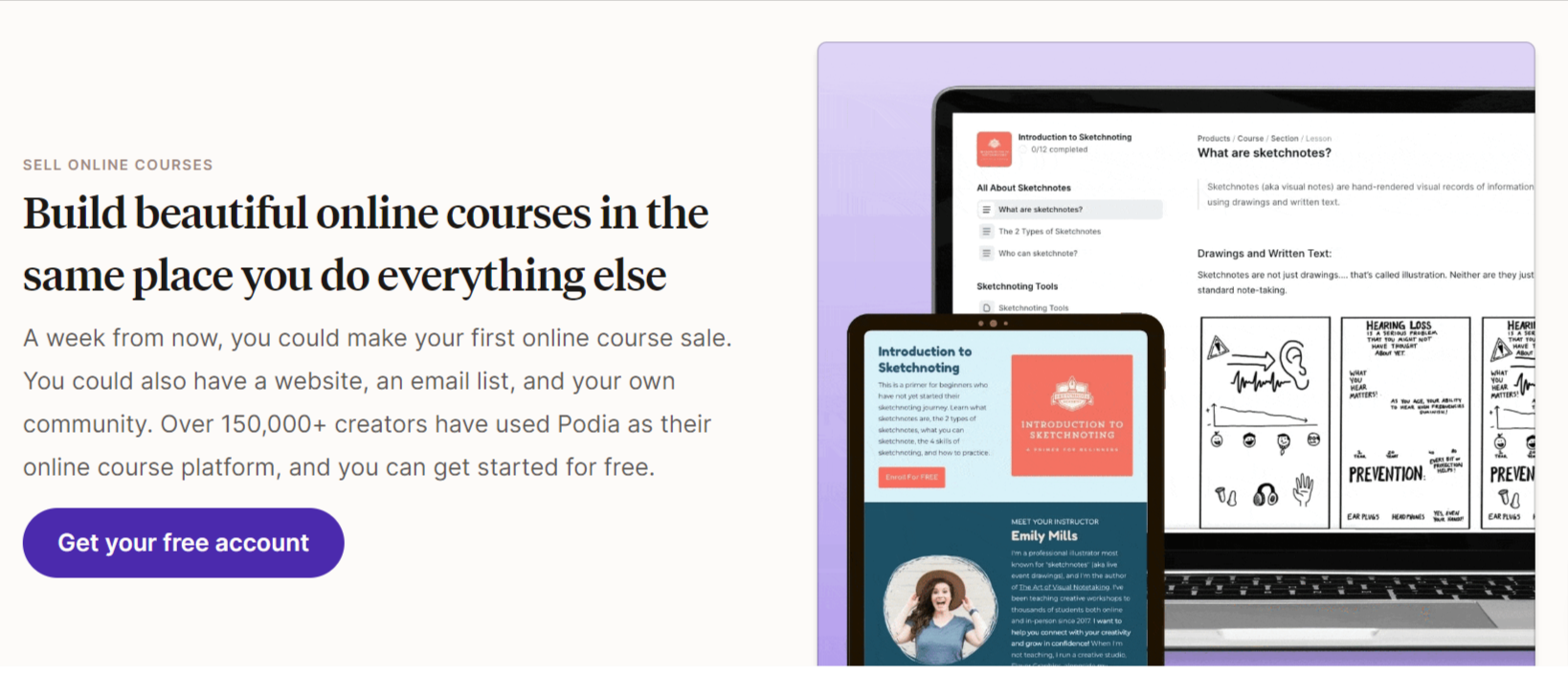
The platform lets you create a website, offer memberships, and publish landing pages. There are also email marketing tools and a live chat feature.
Cost: Plans range from free for the limited introductory option to $59 a month. The fees charged are between 10% and 0%, depending on the plan you choose.
Best for: Online courses and coaching (but you can sell other digital products here, too).
5. Etsy
Another platform best known for physical items, Etsy is also a place to sell digital products.
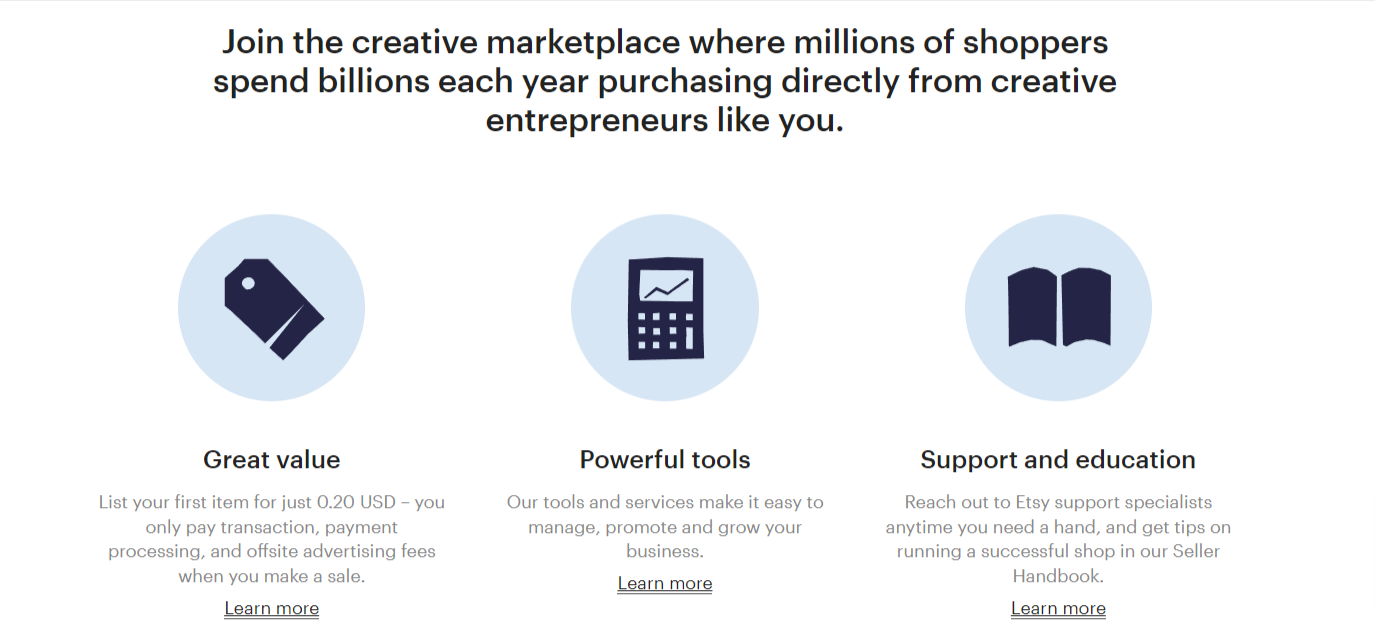
Products you can sell on Etsy include templates, website themes, ebooks, and digital art. Other popular categories are photography (including stock) and audio.
Here’s an example of an Etsy storefront selling Canva templates:

The downsides of selling digital products on Etsy include the intense competition and the fact the site is still mostly geared to vintage and handmade physical goods.
If you want to sell digital products on Etsy, do your homework to ensure you can attract enough buyers to make it worth your while.
Cost: Various fees are applied, including a $.20 listing fee and 6.5% transaction fee. You might also incur ad fees and a one-time fee to set up your Etsy shop.
Best for: Sellers able to stand out in a crowded marketplace.
6. Teachable
We return to the booming e-learning market for our next platform. Teachable is one of the leading platforms for selling online courses.
You can also sell other things, such as ebooks, digital downloads, coaching, and memberships.

Positives include the customization options, marketing tools, and multiple integrations.
However, Teachable is not a one-stop-shop – as our comprehensive Teachable review points out – which might limit its appeal to some users.
Cost: There is a free starter plan, with paid options from $39 to $199 a month. Transaction fees are from 10% to 0%, depending on the plan. The optional BackOffice service incurs additional fees.
Best for: Educators selling courses and related materials.
7. EasyDigitalDownloads
If you want to sell digital products from your WordPress site, this is one of the more popular plugins to offer this functionality.
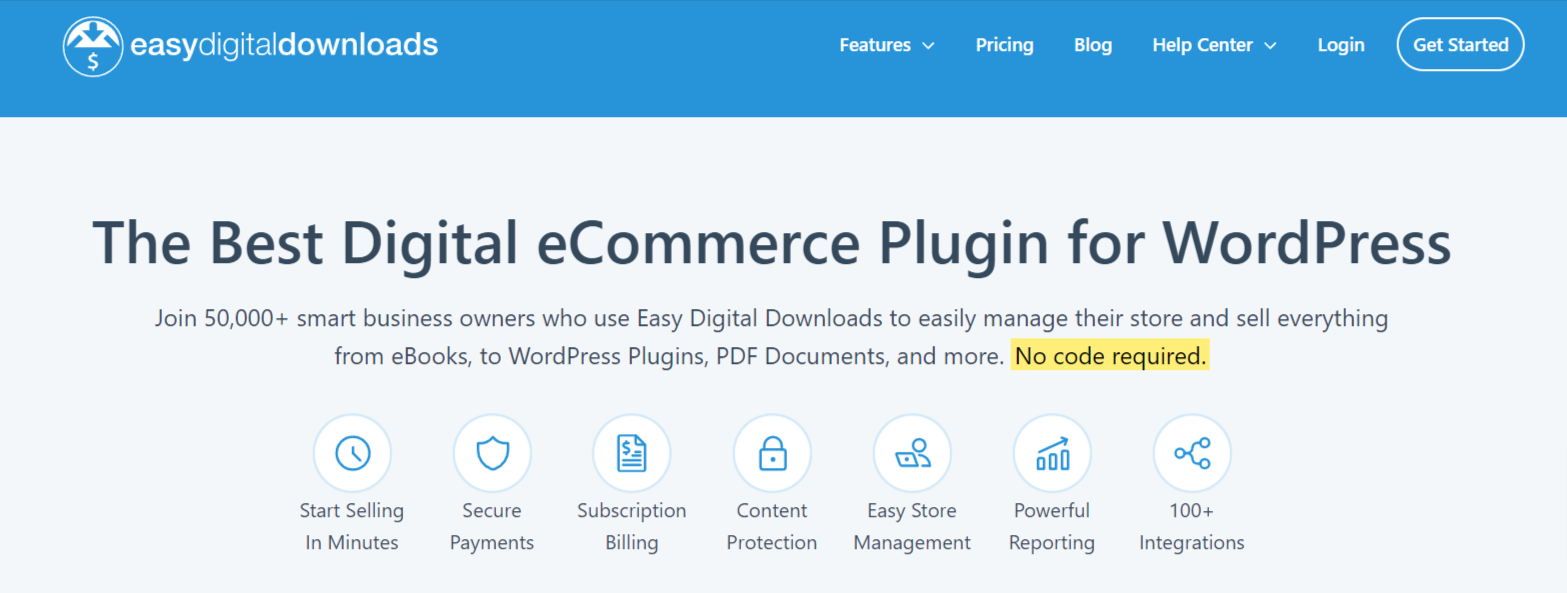
Once installed, you can sell unlimited ebooks, audiovisual content, WordPress plugins and themes, and PDF documents.
The plugin offers a shopping cart, checkout, payment gateway integration, and product management, as well as user support.
EasyDigitalDownloads requires users to have a business plan on WordPress.com which supports third-party plugins.
Cost: The Lite version of the plugin is free. The paid plans are currently available at $99.50 to $499.50 (paid annually). This represents a 50% discount on the regular prices.
Best for: Selling digital products from your own WordPress site.
8. Gumroad
Gumroad is an ecommerce platform for selling all kinds of digital products. Here, you can sell ebooks, podcasts, art, music, games and audio files, among other things.
The platform also supports memberships and physical products, so you have a level of flexibility to branch out into other revenue streams.
Gumroad is easy to use and offers a way to directly connect to customers.

On the downside, it may not be the best place to host courses or memberships. While these are both supported on Gumroad, there are better places out there for selling these types of digital products.
Cost: No monthly fee. A 10% fee is imposed per sale (Whop only charges 3%, just saying…)
Best for: Sellers seeking a low barrier to entry who want to avoid monthly fees.
9. Envato
Envato is a platform for selling design-based creative products, including templates, audio, website themes, code, stock photos, and 3D models.

When you sign up to become an author on Envato, you become part of the relevant marketplace for your work. Here, you build your brand and sell to a motivated audience.
For example, 3DOcean is dedicated to product creators who work with – you’ve guessed it – all things related to 3D design:
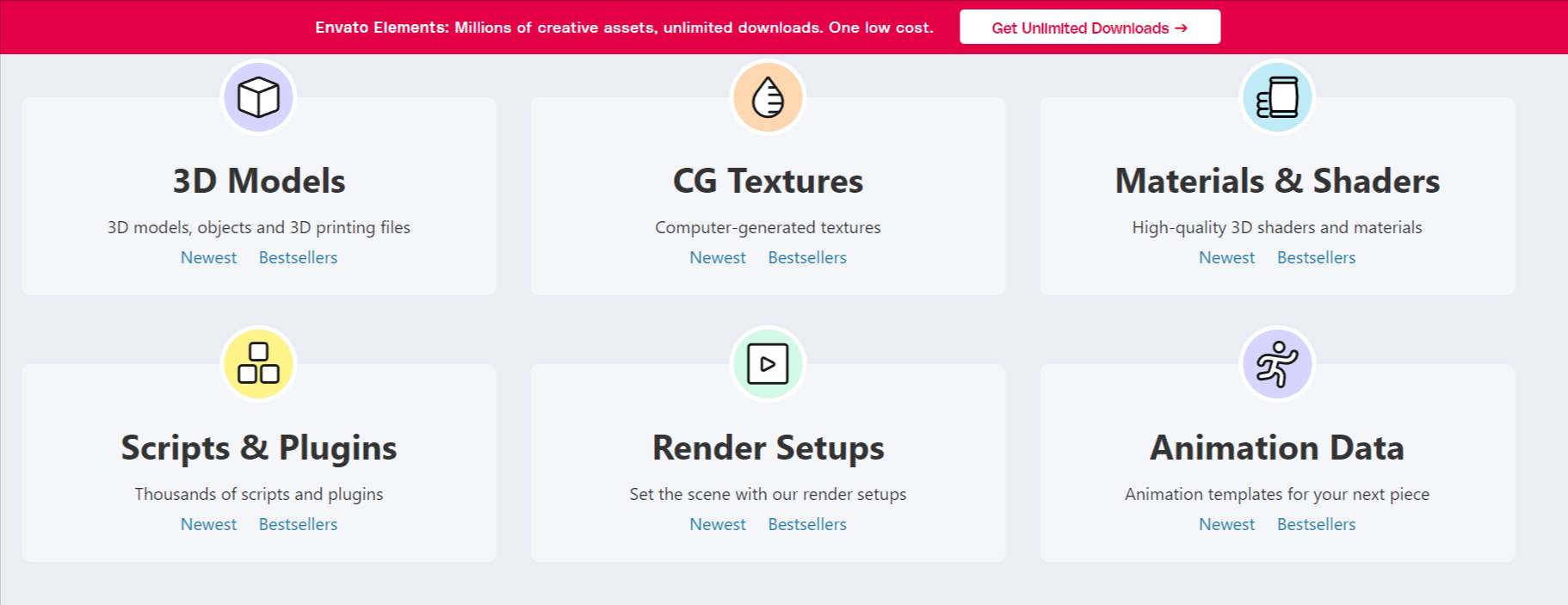
The other Envato marketplaces are:
- AudioJungle
- CodeCanyon
- Themeforest
- GraphicRiver
- PhotoDune
Cost: Envato charges a variable author fee, which is based on factors including the value of your listed items and whether you opt to sell on the platform exclusively. The author fee ranges from 12.5% to 37.5%.
Best for: Sellers who want to focus on tech and design-based products.
10. Amazon
We can’t talk about the best places to sell digital products without a mention of Amazon’s marketplace.
Here, you can sell a limited selection of digital products, including apps and art. However, there are restrictions on what can be sold and who can become a seller.
So, for beginners, the platform is really best for selling self-published ebooks via Kindle Direct Publishing.

The KDP platform gives you all the tools you need to get your ebooks out there.
The downside is that it’s a very crowded marketplace across both fiction and non-fiction, where you’re competing with bestselling authors as well as newbies.
Cost: Authors earn a royalty of 70% or 35% on book sales. Eligible US-based authors can join Kindle Vella, which offers 50% royalties on serialized stories.
Best for: Selling self-published ebooks.
11. Ecwid
Powered by commerce software firm Lightspeed, Ecwid offers the ability to sell digital (and physical) products across multiple platforms.
Users can control sales from a single dashboard, connecting with social media platforms, the Shop app, Google, and individual websites.
Ecwid is compatible with all major website builders, including WordPress, Wix, and Weebly.
The types of digital products which can be sold via Ecwid include services, subscriptions, recipes, music, design-based content, and photography.
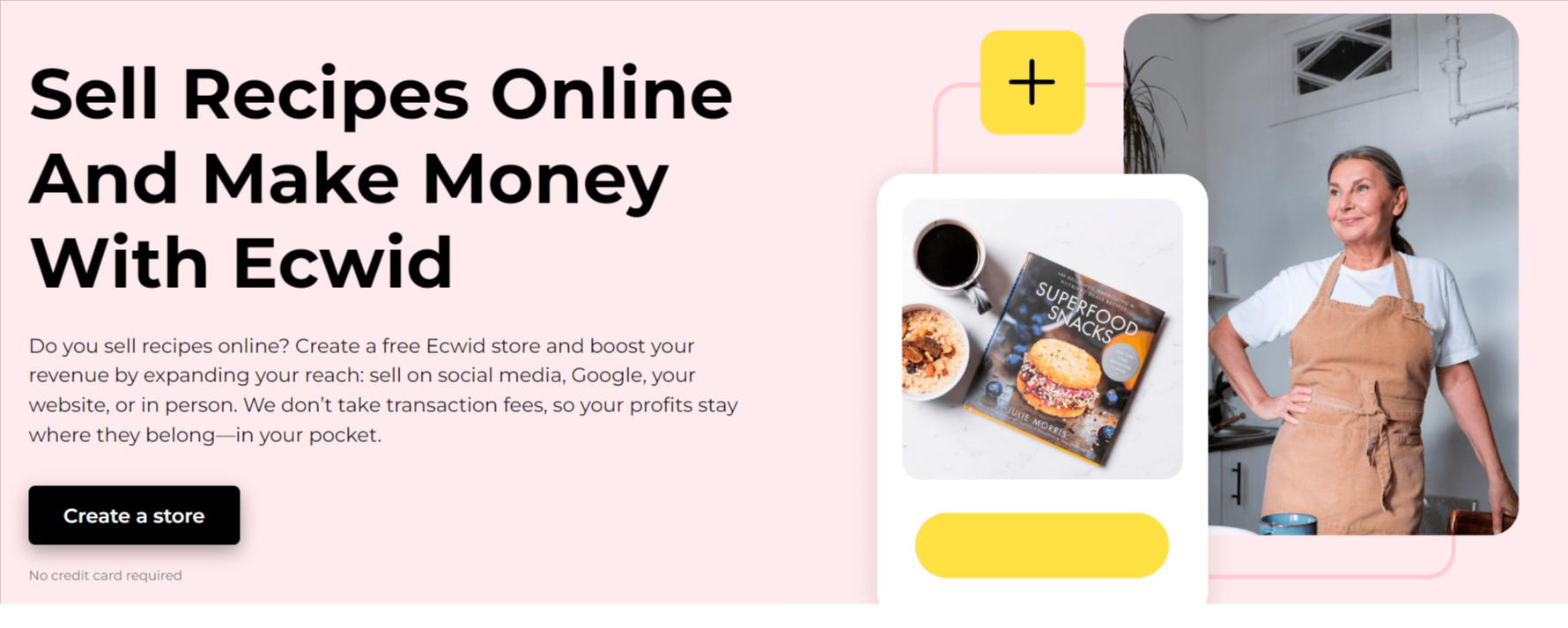
Negative reviews of Ecwid mention steep unexpected price rises, users’ online stores being closed without notice, and complicated functionality.
Cost: Ecwid offers a free plan with limited features. Paid plans work out at between $21 and $89 a month if paid annually. When paid monthly, they cost $25 to $105.
Best for: Selling digital products across multiple platforms.
12. Payhip
Payhip is another popular platform for anyone who wants to know how to sell digital products.
You can use the platform to create a website to sell courses, memberships, downloads, and coaching. It also supports selling physical products.
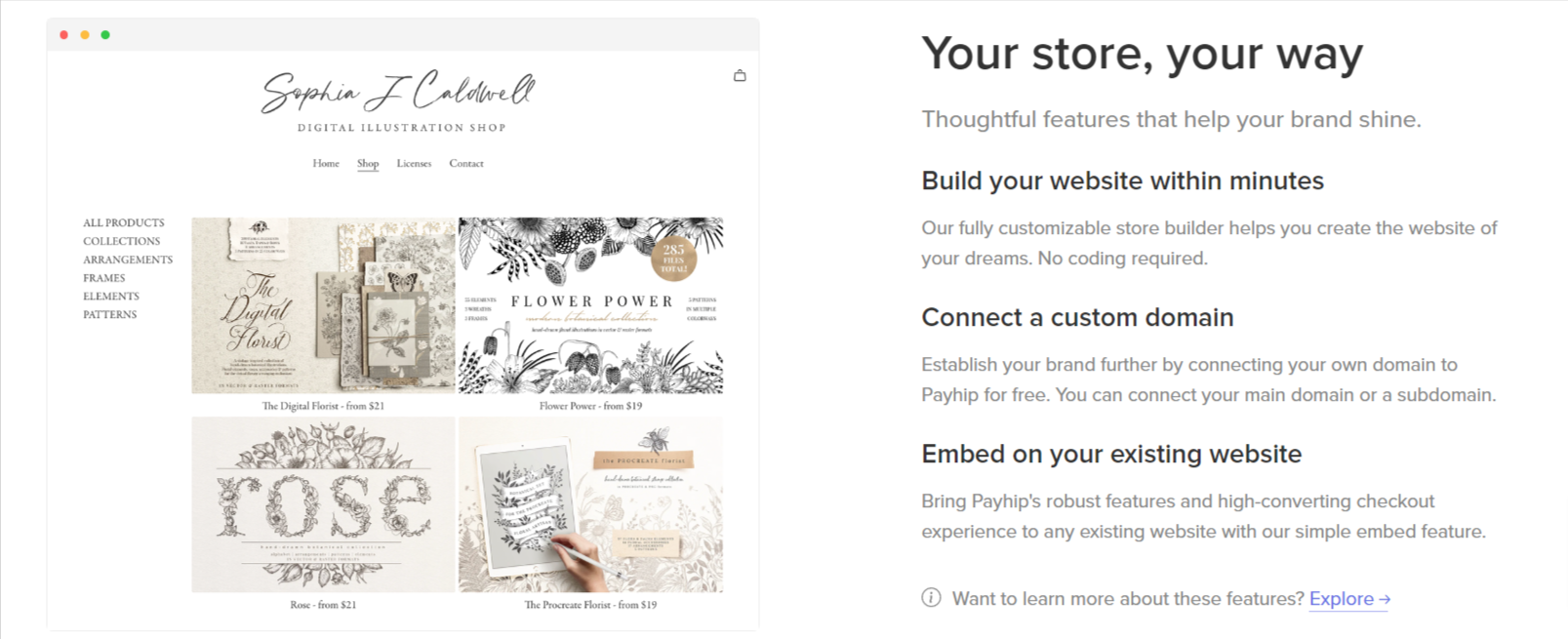
It lets you build an attractive storefront, connect a custom domain, and even embed Payhip into an existing website.
The downsides of Payhip reported by some users include a lack of customization options.
There have also been some performance issues – not great when you want that passive income rolling in uninterrupted.
Cost: The free plan, which includes all the platform’s features, has a 5% transaction charge applied. The $29 Plus plan comes with a 2% transaction fee, while the $99 Pro option has no transaction fees.
Best for: Sellers who want an easy-to-use platform and don’t mind compromising a little on performance and functionality.
13. Creative Market
If you dream of selling creative, design-based products, Creative Market is a good option, and a great alternative to Etsy.
You can open your own store selling all kinds of graphics, fonts, templates, and other arts-based content to its network of 10 million members.

The site gives you the freedom to set your own prices, subject to minimum levels determined by Creative Market.
Cost: Creative Market takes a huge 50% commission on sales.
Best for: Selling design-based content.
14. Sellfy
A heavy-hitter in the world of online commerce, Sellfy offers an all-in-one platform for selling digital (and physical) products.
It’s good for a range of products, including videos, subscriptions, ebooks, and music.
You can create your own storefront and there is also an option to sell through social media.
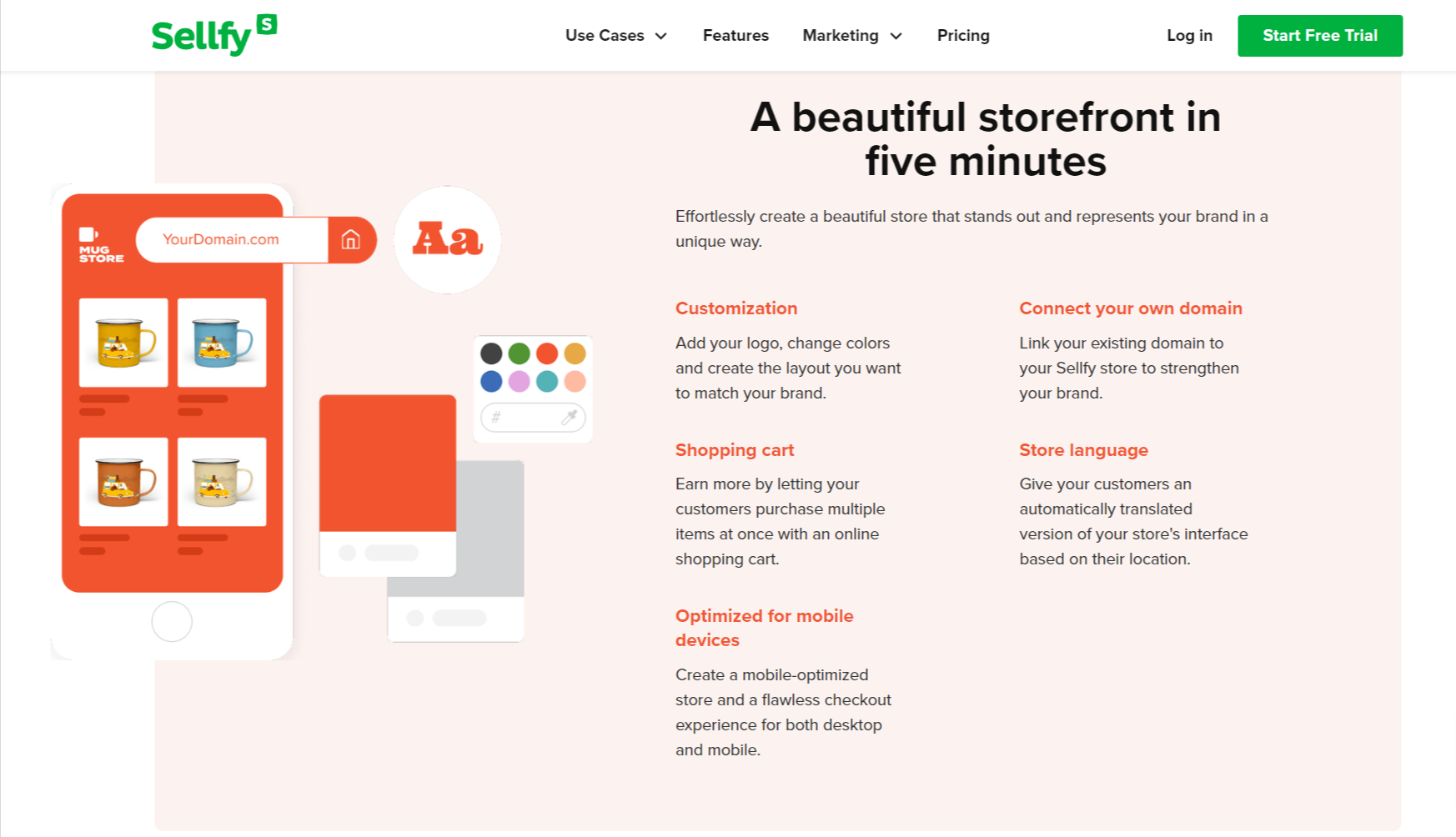
The basic Sellfy offering is aimed at sellers who make less than $200k a year. Once you exceed this, you have to contact Sellfy to learn about what it offers so-called “high volume sellers”.
Cost: If paid month-by-month, Sellfy plans cost between $29 and $209. Pay in advance for a 12-month or 24-month subscription and you get a discount. There are no transaction fees. A 14-day free trial is currently available.
Best for: Selling less than $200k-worth of digital products.
15. Thinkific
Thinkific is another platform skewed towards e-learning. It offers the ability to sell courses, podcasts, memberships, and downloadable content.
The platform also promotes itself as a place where content creators can build a community.

More sophisticated than Udemy in terms of functionality, Thinkific is a good for option for educators who want to develop a strong online brand.
Cost: The plans range from $49 to $199 a month, with a 25% discount if you pay annually. A 14-day free trial is currently running.
Best for: Selling online learning products and building a community.
So, there you have it, 15 platforms where you can sell your products and begin building a sustainable online business which has unlimited growth potential. Our advice to anyone just starting out or looking to diversify is to pick a platform with low fees, which offers the flexibility to seamlessly sell a range of products.
Benefits of Selling Digital Products
Now you know where to sell digital products, let's take a look at why you should be selling them. Digital products have lots of advantages for online entrepreneurs. These include:
Easy to get started
One of the great things about selling digital products is that it’s an easy space to get into. Whatever type of digital product you want to sell, there are lots of tools available to support your journey.
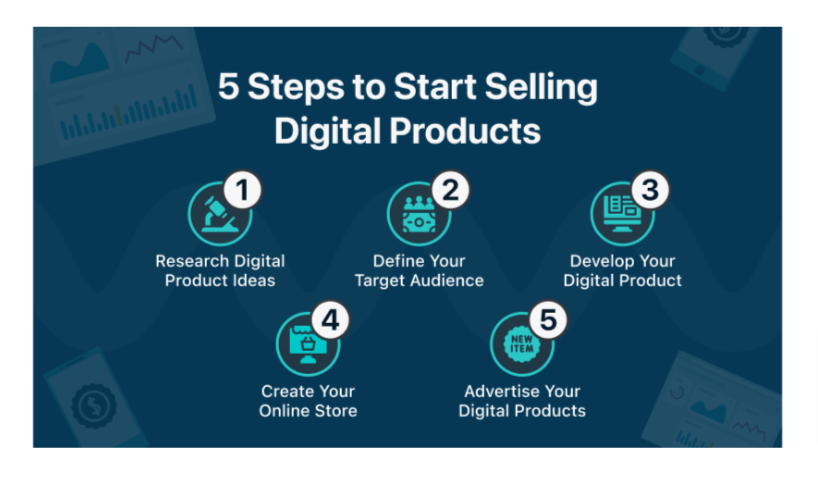
With the rise of AI, the process is even easier. AI tools now exist which can help you to create and sell more digital products to maximize your profits.
Sell products in multiple niches
Whatever niche or sub-niche you can think of, digital products can be tailored to fit. This gives you the freedom to focus on one topic or pivot to something else.
Many digital products are what’s known as evergreen, meaning they are in constant demand.
So, whatever your expertise or area of interest, you can find an audience willing to pay over and over for your digital products.
Generate passive income
One of the biggest draws of digital products is that they deliver passive income.
This is the gold standard for selling online. It means that you create something one time and it goes on to generate multiple sales.
Once you’ve set up your online store or listed the product on your chosen platforms, people can click on the link and make a purchase at any time.
You get paid without doing anything – what could be better than that?
Options for cross-selling
Many digital products are natural complements to each other. This lets you build a strong online brand and earn from multiple income streams.
For example, ebooks can lead to related podcasts, newsletters, and courses. Meanwhile, if you sell art-based digital products, you can expand to printing designs on physical products or company logos.
Digital products are a gift that keeps on giving – offering unlimited opportunities to grow and rake in $$$.
Build a community
Related to the cross-selling point is the ability to use your digital content to build a community.
This can lead to paid memberships and subscriptions, giving your community premium content and access that adds value for them and adds zeros to your bank account.
The most successful digital entrepreneurs create content around their niche to set themselves up as an authority and attract an engaged audience.
Low overheads
Compared to some other business ventures, creating and selling digital products is cheap to get into.
To clarify, that doesn’t mean free. Costs you might run up against include:
- Product design
- Software
- Paid ads
- Web hosting / domain
- Selling fees
- Outsourcing
However, the relatively low overheads mean you can be up and running (and counting your profits) in no time – even on a shoestring budget.
You can also forget about warehousing, dropshipping or any of the other logistical issues that come with selling physical products.
This is on top of the fact that digital products can achieve an eye-opening 70% to 80% profit margin.
Sell More Products and Make More Money With Whop

Looking for the best place to sell digital products?
Look no further. Whop is the number one place to sell anything online.
Our all-in-one platform gives you the flexibility to create an online business which is right for you. We have all the tools you need to build your audience and grow as big as you can dream.
Even better, while many platforms take a large cut of your hard-won profits, we don’t.
All you pay is 3% on sales. We get paid as you get paid, so everyone wins.
Already have a great idea? Get it up and running in lightning quick time with our easy-to-use platform. Or, if you need more help, explore our huge collection of resources to find your inspiration.
Your successful online business is right around the corner, so take the first step with us today.
Sell digital products (and anything else you can think of) with Whop – we’re all you need to turn your dreams of financial freedom into a profitable reality.





